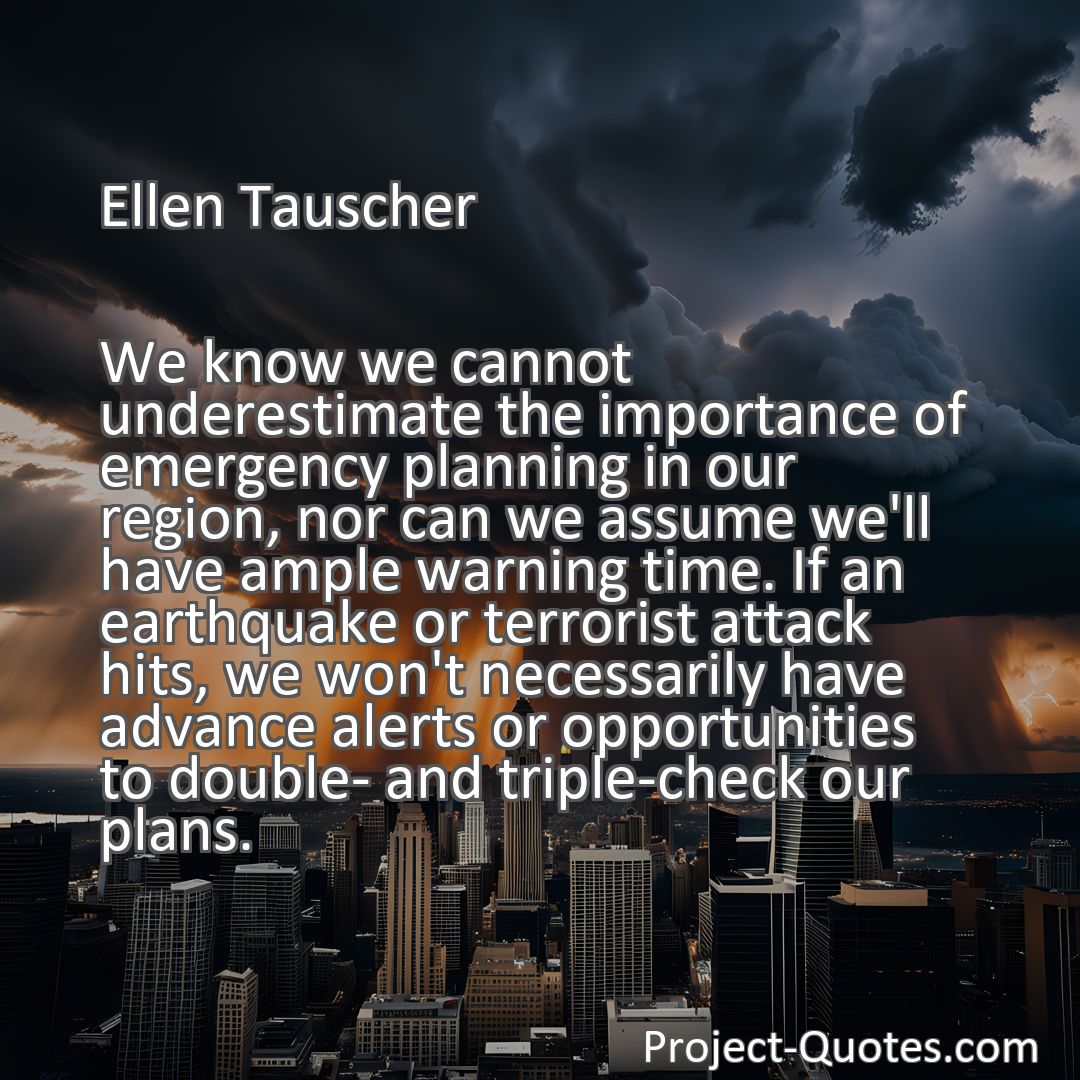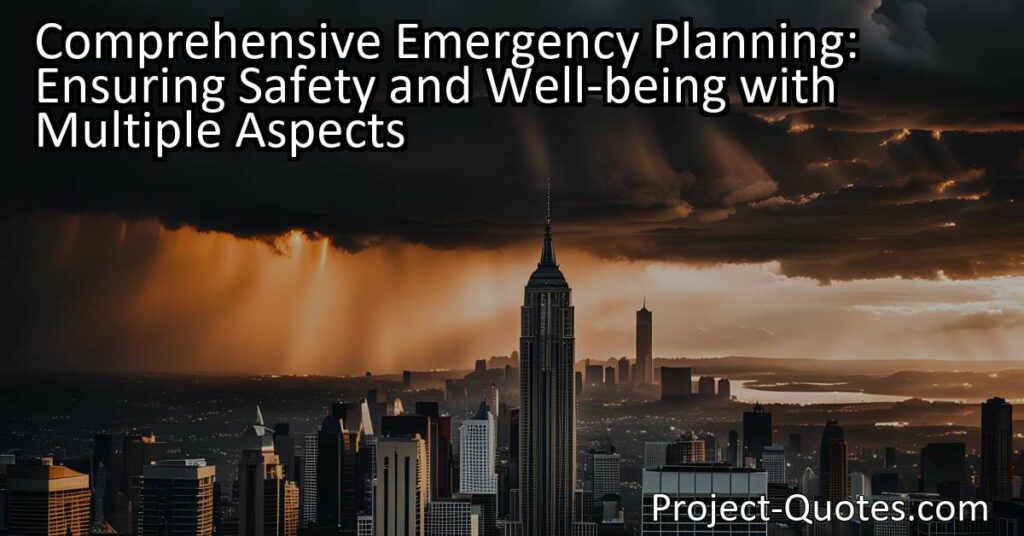We know we cannot underestimate the importance of emergency planning in our region, nor can we assume we’ll have ample warning time. If an earthquake or terrorist attack hits, we won’t necessarily have advance alerts or opportunities to double- and triple-check our plans.
Ellen Tauscher
When it comes to emergency planning, there are several important aspects to consider. From understanding potential risks and creating communication plans to gathering essential supplies and developing evacuation routes, a comprehensive emergency plan covers all these aspects to ensure safety and well-being. By prioritizing these multiple facets of emergency planning, we can better prepare for and respond to unexpected crises.
Table of Contents
- 1 We know we cannot underestimate the importance of emergency planning in our region, nor can we assume we’ll have ample warning time. If an earthquake or terrorist attack hits, we won’t necessarily have advance alerts or opportunities to double- and triple-check our plans.
- 2 Ellen Tauscher
- 3 Meaning of Quote – We know we cannot underestimate the importance of emergency planning in our region, nor can we assume we’ll have ample warning time. If an earthquake or terrorist attack hits, we won’t necessarily have advance alerts or opportunities to double- and triple-check our plans.
- 4 Freely Shareable Quote Image
- 5 Related
Meaning of Quote – We know we cannot underestimate the importance of emergency planning in our region, nor can we assume we’ll have ample warning time. If an earthquake or terrorist attack hits, we won’t necessarily have advance alerts or opportunities to double- and triple-check our plans.
In today’s uncertain world, it is crucial for us to understand and acknowledge the significance of emergency planning. As Ellen Tauscher wisely stated, we cannot underestimate the importance of being prepared in our region. Natural disasters and unforeseen events such as terrorist attacks can strike without warning, leaving us with little to no time to react. Therefore, being proactive in our emergency planning is essential for our safety and well-being.
When it comes to emergencies, every minute counts. It is not uncommon for people to assume that they will have ample time to prepare when disaster strikes. However, as Tauscher pointed out, we cannot rely on advance alerts or opportunities to double- and triple-check our plans. This means that we must be ready at all times and have well-thought-out emergency plans in place.
First and foremost, it is crucial to understand the potential risks that our region may face. Whether we live in an earthquake-prone area or a region susceptible to terrorist attacks, knowing the specific threats allows us to tailor our emergency plans accordingly. By identifying the potential hazards and their likelihood, we can take the necessary precautions to mitigate risks and ensure our safety.
Creating a comprehensive emergency plan involves multiple aspects. One of the essential steps is to establish a communication plan with our family, friends, and neighbors. In times of crisis, ensuring effective communication is vital for coordinating efforts and making informed decisions. Having a designated meeting place or an emergency contact person can help us stay connected and updated.
Another key element of emergency planning is gathering essential supplies. Being prepared means having access to food, water, medication, and other critical items that could sustain us in case of an emergency. Creating an emergency kit with these supplies is an excellent way to ensure that we will have the necessary resources during challenging times.
Furthermore, it is imperative to have a clear evacuation plan in place. Whether it’s a natural disaster or a human-made crisis, knowing how to safely evacuate our homes or workplaces can save lives. Identifying multiple evacuation routes and familiarizing ourselves with escape routes in public areas can significantly contribute to our safety.
Emergency planning also requires us to consider the needs of vulnerable populations, such as the elderly, children, or individuals with disabilities. These individuals may require additional assistance during emergencies, and it is our responsibility as a community to ensure their safety and well-being. By proactively addressing their needs, we can build a more inclusive and resilient community.
Regularly reviewing and practicing our emergency plans is just as important as creating them. As Tauscher emphasized, we cannot assume that we will always have advance alerts or ample time to prepare. By conducting drills and simulations, we can identify potential flaws in our plans and make necessary adjustments. This practice also helps us become more familiar with the actions we need to take during emergencies, reducing panic and increasing the effectiveness of our response.
While individual preparedness is essential, it is equally crucial for the community as a whole to come together in times of crisis. Local governments and organizations play a significant role in emergency planning, as they have the resources and expertise to coordinate efforts effectively. It is essential for communities to establish emergency management systems that facilitate communication, provide timely updates, and allocate resources efficiently.
In addition to local authorities, it is vital for individuals to get involved in their communities’ emergency planning efforts. Participating in disaster preparedness workshops and volunteering for emergency response organizations can make a significant difference. By educating ourselves and actively contributing to building a resilient community, we are not only safeguarding our own well-being but also the well-being of our neighbors.
In conclusion, Ellen Tauscher’s quote about the importance of emergency planning resonates deeply in today’s uncertain world. We must understand that disasters can strike without warning, making it imperative to be proactive in our preparation. By identifying potential risks, developing communication plans, gathering essential supplies, creating evacuation plans, and involving the entire community, we can enhance our resilience and ability to cope with emergencies. Let us not underestimate the significance of emergency planning, but rather prioritize the safety and well-being of ourselves and those around us.
I hope this quote inspired image brings you hope and peace. Share it with someone who needs it today!


